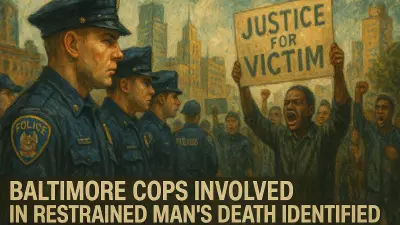Before a jury convicted Barry Croft Jr. and Adam Fox of conspiring to kidnap the governor of Michigan, federal law enforcement and prosecutors were staring at yet another setback in a decade of failures on the domestic extremism front.

The two men were at the center of a plot to kidnap Gov. Gretchen Whitmer in protest of her pandemic policies tied to the Wolverine Watchmen, a self-styled militia group. The plot involved explosives, staking out Whitmer’s vacation home and, according to FBI investigators, potentially murder.
Despite having the plotters on tape and in writing discussing the details of the plan, the feds faced another potential high-profile loss in an extremism case that once looked like a slam dunk.
In their initial trial, a jury deadlocked on the charges against Croft and Fox, seen by prosecutors as the ringleaders of the plot.
Sure, a co-conspirator had been sentenced to six years after pleading guilty and another plotter also pleaded guilty and is awaiting sentencing. But two others were found not guilty.
If Croft and Fox got off the hook it could have sent a troubling message about the difficulty of prosecuting extremist violence, said former federal prosecutor Mary McCord, who runs the Institute for Constitutional Advocacy and Protection at Georgetown Law School.
“Just like any type of terrorism case, it’s important to bring cases that are winnable, and to win those cases, because otherwise, you’re not going to have the impact on tamping down domestic extremist violence,” said McCord, who successfully sued a number of militia groups that were involved in the deadly 2017 Unite The Right Rally in Charlottesville, Va. “So I think in terms of accountability and deterrence, it’s quite important that this second trial resulted in convictions.”
McCord helped the City of Charlottesville file civil lawsuits against groups to seek a court order to stop them from returning to the city. The lawsuit argued that those involved violated the state’s anti-paramilitary laws.
On Aug. 23 a jury convicted Croft and Fox of multiple felonies, including conspiracy to kidnap a governor and conspiracy to use weapons of mass destruction. They face up to life in prison.
“These defendants believed their anti-government views justified violence,” the FBI’s Detroit Field Office Special Agent in Charge James A. Tarasca said in a prepared statement. “(The) verdict sends a clear message that they were wrong in their assessment. Violence is never the answer. The FBI will continue to investigate anyone who seeks to engage in violence in furtherance of any ideological cause and hold them accountable.”
Daryl Johnson, a former Homeland Security analyst who spent 25 years tracking domestic extremism for the federal government, said the convictions could be a turning point in what historically has been a weak federal response to domestic extremism when Americans are implicated.
“I think it sends a strong message that the government is finally taking this threat seriously,” he said.
Domestic terrorist attacks have been on the rise, especially in the past two years, according to the Center for Strategic and International Studies report “Pushed To Extremes: Domestic Terrorism amid Polarization and Protest.” Both far-right and far-left instigated violence has been on the rise, but the far-right accounts for far more of the incidents, according to the report.
But it has been a decade of failures when it comes to prosecuting people who take up arms against federal agents. No one encapsulates that more than the Bundy family, who have been at the center of two armed standoffs with federal agents.
First, in 2014 federal agents surrounded the ranch of family patriarch Cliven Bundy. He owed more than $1 million in unpaid grazing fees and the feds were there to seize his cattle. Instead, militia members and other armed Americans from around the country descended on the ranch. In the end, the feds backed down.
Cliven Bundy and his sons went to trial for their roles in the standoff and represented themselves in federal court. They all got off.
Two years after the ranch standoff, Cliven’s sons, Ammon and Ryan Bundy, led an armed takeover of the Malheur National Wildlife Refuge in Oregon. Oregon state troopers shot and killed Bundy family friend LaVoy Finnicum after he ran a law enforcement checkpoint and reached for a gun. The Bundys were acquitted.
“My perspective, from talking to current and former intelligence analysts that were looking at domestic terrorism as well as agents working these cases, is that it was demoralizing,” said Johnson, who now runs the domestic extremism tracking group DT Analytics.
So, the Michigan convictions came at a critical moment. McCord, though, sounded a cautionary note.
“We’re seeing some of that rhetoric picked up shamefully by elected officials, members of Congress, those running for elections and so both of these things are happening at once and the deterrent effect of some of these (Michigan) sentences and some of these prosecutions might be muted, particularly among those who are the most ardent MAGA followers,” she said.







